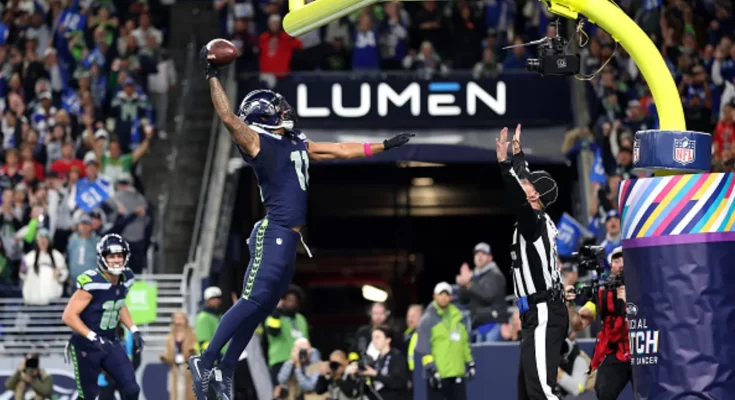The atmosphere inside the stadium was electric, a mixture of tension, disbelief, and roaring chaos. It was late in the fourth quarter when Jaxon Smith-Njigba — known to fans simply as JSN — made a play that instantly went viral. What started as a routine reception turned into a highlight that would be replayed endlessly across social media, talk shows, and sports debates. But not because of a touchdown, a spectacular catch, or a game-winning moment — it was because of what happened afterward. In a split-second decision that left everyone stunned, JSN turned his emotions toward the official standing nearby, and what followed was as surreal as it was controversial.
The Seattle wideout had just absorbed a massive hit near the sideline, a hit that many in the crowd believed deserved a penalty flag for unnecessary roughness. The stadium erupted in boos when no flag came out. JSN, usually calm and composed, got up visibly frustrated. He had been targeted multiple times throughout the game, and several questionable no-calls had left him and his teammates fuming. The adrenaline, the pressure, and perhaps a touch of showmanship collided all at once. As he walked back toward the huddle, JSN glanced over at the referee who made no call and decided to express himself in a way no one expected.
Moments later, social media exploded. Cameras had caught him gesturing toward the official, then — in what looked like a deliberate move — celebrating a catch directly over the referee’s position, almost as if “posterizing” him. In basketball terms, he had “posted up” the ref like an opponent, turning what should have been a highlight celebration into an act of defiance. Within seconds, a yellow flag soared through the air. The crowd gasped. The announcers could hardly process what they were seeing.
“Unbelievable,” one commentator said. “A flag was promptly thrown — and it’s not for taunting a player. JSN just posterized the referee!”
What made the moment even more surreal was how it blurred the line between emotion and disrespect. Players celebrate over opponents all the time; they flex, they talk, they let the energy out. But targeting an official — even playfully — is seen as crossing a line of professionalism and decorum that the NFL strictly enforces. The penalty, officially called “unsportsmanlike conduct,” was a swift reminder that referees are off-limits.
As the game resumed, JSN’s face told the story of a man who instantly regretted it. He wasn’t smiling or laughing. His quarterback gave him a quiet pat on the shoulder, a veteran move that said: “We need you locked in.” On the sidelines, head coach Mike Macdonald had a brief, serious word with him, one that seemed to mix discipline with understanding. The team couldn’t afford a distraction, especially not in a tight divisional matchup.
After the game, reporters swarmed. The Seahawks had pulled off a gritty win, but every microphone and every question revolved around that one play. JSN, calm but humble, addressed the media with a mix of accountability and self-awareness. “It was heat of the moment,” he said. “I let my emotions get the best of me. I wasn’t trying to disrespect anyone — especially not the officials. I just wanted to stand up for myself after what I felt was a missed call. But I get it. That’s on me.”
Those few sentences summed up the maturity of a young player learning in real time the cost of losing composure on a big stage. While the NFL has embraced emotion and individuality more in recent years, there’s still a clear boundary when it comes to the integrity of officiating. Even the perception of mocking or confronting an official undermines the authority that keeps the game under control.
Fans, however, were split. Social media erupted with debate. Some called the penalty overblown, saying JSN’s “poster” was more creative expression than confrontation. Memes flooded Twitter and Instagram, with captions like “JSN 1 — Ref 0” and “He really dunked on the zebra.” Others, including former players and analysts, argued that the league was right to enforce discipline. “You can’t have players turning refs into props,” one analyst said on ESPN. “There’s got to be respect both ways.”
That tension — between freedom of expression and the sanctity of the game’s rules — became the talking point of the week. Every sports talk show dissected it. Was JSN’s gesture playful or defiant? Should the referee have ignored it, or did he do the right thing? Even fans who didn’t support the Seahawks found themselves intrigued by the cultural symbolism behind the act.
In many ways, JSN’s moment captured something much larger than football. It was about emotion in sports — how athletes, under immense pressure and scrutiny, balance their humanity against expectations of professionalism. Every week, players are asked to play with heart but think with restraint. They are told to show passion but stay within invisible lines that shift with each era of the game. JSN’s “poster” was a collision of those contradictions.
Ironically, the incident may have bonded the Seahawks locker room even tighter. Several teammates publicly backed him afterward. Veteran wide receiver Tyler Lockett tweeted, “We’ve all had that one moment we wish we could take back. JSN’s heart is in the right place. Love his fire.” Geno Smith, the team’s quarterback, echoed a similar sentiment: “We ride with our guy. We’ll clean it up and move forward.”
Privately, though, the coaching staff likely emphasized the importance of discipline. With playoff positioning on the line, any unsportsmanlike penalties could swing games — and reputations. JSN’s immense talent isn’t in question, but moments like these can define narratives. For a young receiver trying to establish himself among elite company, this was a lesson in visibility: when you shine on the field, every move — even the wrong ones — gets magnified.
In the days that followed, JSN took the high road. He avoided social media commentary and instead focused on practice. Reporters noticed his renewed concentration and professionalism. One beat writer described him as “all business, no distractions.” That quiet focus spoke volumes. He wasn’t interested in defending what happened; he wanted to move past it by letting his performance do the talking.
Then came Sunday. The Seahawks faced another high-stakes game, and all eyes were on JSN. Early in the second quarter, he made a leaping catch across the middle, took a hit, and bounced right back up. No gestures, no emotion — just calm, collected focus. The crowd, aware of the previous week’s controversy, responded with a mix of cheers and applause. It was as if they were watching a redemption arc unfold live.
Later in the game, JSN scored a touchdown on a perfect route, extending Seattle’s lead. This time, his celebration was simple — a quick point to the sky, a tap on his chest, and a nod toward his teammates. The message was clear: lesson learned.
Afterward, when asked about the change in demeanor, JSN smiled. “I love this game,” he said. “Sometimes your passion can spill over. But the best way to speak is through your play. That’s what I’m focused on now.”
That statement resonated far beyond Seattle. Across the league, other players and coaches referenced it as an example of growth. Sports, at their core, are about emotion — but also evolution. Every young star makes a mistake or two along the way; what defines them is how they respond.
As for the referee at the center of it all, he declined to comment publicly. The league office quietly reviewed the play, confirmed the penalty was justified, and moved on without further discipline. Behind closed doors, officials are trained to maintain composure in such situations, to keep the game flowing without escalation. And in this case, cooler heads prevailed.
But among fans, the “poster of the ref” moment became an instant meme — part of NFL lore. Kids recreated it in backyard games, TikTok edits gave it cinematic music, and one artist even painted it as a tongue-in-cheek “modern football masterpiece.” For all the controversy, the incident captured a rare authenticity that fans crave: a human moment in a billion-dollar, tightly controlled league.
In retrospect, the flag wasn’t just about discipline — it was a symbolic reset. It reminded players where the line is drawn, and it reminded fans how thin that line can be between entertainment and chaos. For JSN, it was a personal reminder of the balance between expression and accountability.
By the season’s end, his stats spoke louder than the viral clip ever could. He became one of Seattle’s most reliable weapons, a receiver known for precision, toughness, and quiet fire. Teammates often mentioned how much he’d matured since that incident. “He’s become one of our emotional anchors,” Lockett said later. “He still plays with passion — but now it’s controlled, focused. That’s leadership.”
And so, that fleeting moment — that spontaneous act of defiance — turned into something unexpected: a turning point in a young athlete’s career. What began as an impulsive “poster” over a referee became the spark for growth, humility, and leadership.
In a league built on split-second decisions, JSN learned the hard way that control is just as powerful as emotion. A flag may have been thrown, but what it represented wasn’t just a penalty. It was a pause, a reminder, a lesson written not in yards lost but in character gained.
By the time the season’s final whistle blew, the narrative had shifted completely. Fans no longer talked about the flag. They talked about how JSN had responded — how he turned a viral mistake into a story of composure and redemption. In the end, that’s what great players do: they fall, they rise, and they redefine what it means to play the game the right way.



